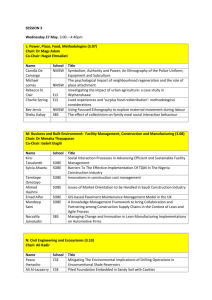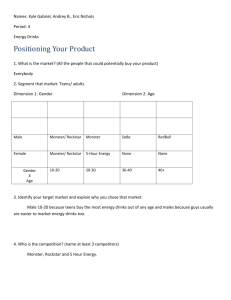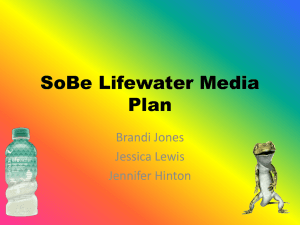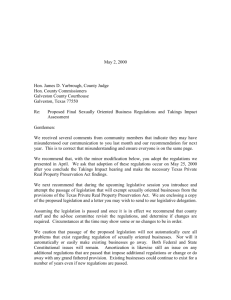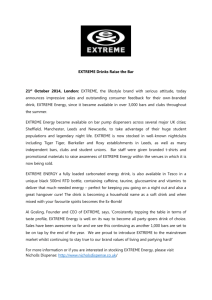case 10 - Pearson
advertisement
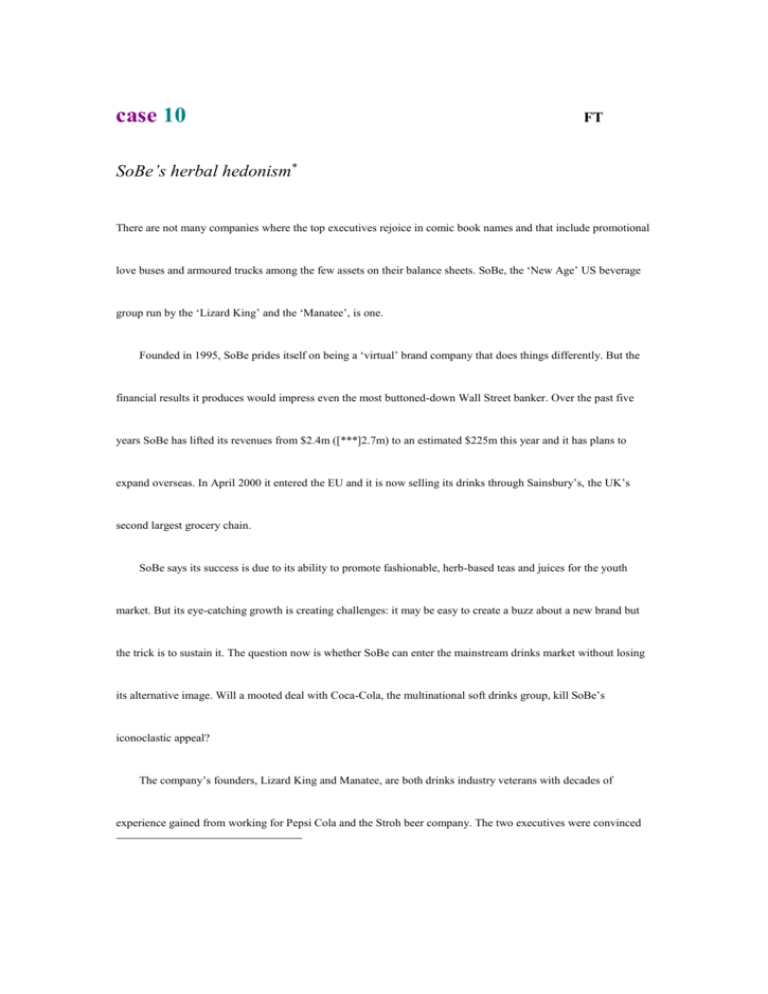
case 10 FT SoBe’s herbal hedonism* There are not many companies where the top executives rejoice in comic book names and that include promotional love buses and armoured trucks among the few assets on their balance sheets. SoBe, the ‘New Age’ US beverage group run by the ‘Lizard King’ and the ‘Manatee’, is one. Founded in 1995, SoBe prides itself on being a ‘virtual’ brand company that does things differently. But the financial results it produces would impress even the most buttoned-down Wall Street banker. Over the past five years SoBe has lifted its revenues from $2.4m ([***]2.7m) to an estimated $225m this year and it has plans to expand overseas. In April 2000 it entered the EU and it is now selling its drinks through Sainsbury’s, the UK’s second largest grocery chain. SoBe says its success is due to its ability to promote fashionable, herb-based teas and juices for the youth market. But its eye-catching growth is creating challenges: it may be easy to create a buzz about a new brand but the trick is to sustain it. The question now is whether SoBe can enter the mainstream drinks market without losing its alternative image. Will a mooted deal with Coca-Cola, the multinational soft drinks group, kill SoBe’s iconoclastic appeal? The company’s founders, Lizard King and Manatee, are both drinks industry veterans with decades of experience gained from working for Pepsi Cola and the Stroh beer company. The two executives were convinced there was a niche for a different kind of New Age drink that would appeal to young partygoers. They were determined to build their brand from the grassroots to maximise its youth appeal. ‘Kids are fickle and hard to reach. These are people you can turn on or turn off in a heartbeat. You have to stay fresh and new’, says Manatee. ‘We are building this brand up and down the street and can conceive of a product and put it into the market within two and a half months.’ In order to project an image of healthy hedonism, SoBe added herbs and nutrients such as ginseng, ginkgo and guarana to its teas and juices. ‘The only trouble is that herbs taste like shit’, says Lizard Communicator, vice-president of corporate communications. So the company consulted a flavour laboratory in Heidelberg, Germany, to come up with sweet-tasting products. SoBe then packaged its drinks in chunky, clear glass bottles labelling them with two lizards, which were supposed to represent the yin and yang of life. SoBe branded its drinks by characteristics – Power, Wisdom and Drive – rather than flavours. Its latest product is called Adrenaline Rush. The company has also concentrated on grassroots marketing, selling its drinks through what it calls the ‘single-serve, cold channel’ in local supermarkets, petrol stations and delicatessens. To attract young sports fanatics, SoBe has also set up fridges in bike and snowboard shops and sends its love buses and armoured cars out to extreme sports events, where they distribute ‘lizard gear’ such as T-shirts, keyrings and belts and hand out free samples of the drinks. The brand is also promoted by Team Lizard, a group of athletes sponsored by SoBe, including Biker Sherlock, the downhill skateboarder and street luger, and John Daly, the long-hitting golf champion. SoBe has encouraged customer feedback by setting up a toll-free telephone line where consumers can tell the Lizard King what they think of the latest products. They can also post their comments on SoBe’s interactive website, which receives more than 2m hits a month. This summer SoBe launched a $9m radio advertising campaign incorporating some of these personal customer testimonials. So far SoBe has shied away from mainstream television advertising. ‘We have not yet found a creative story that would bring in more customers than it would lose’, says Manatee. ‘A lot of kids are simply wallpapering Coke and Pepsi ads because they are not doing anything different.’ However, SoBe is not alone in the New Age drinks market: competition is increasingly fierce as the traditional soft-drinks market turns flat. For the past 28 years Snapple has sold similar drinks, with varying degrees of success. But the company has just been bought for $1.45bn by Cadbury Schweppes, the UK drinks group, which promises to add financial and managerial muscle to the market-leading Snapple brand. ‘I think it was a great strategic move by Cadbury and enhances their distribution system’, says Manatee. ‘It has also helped legitimise the New Age category (of drinks) and has spruced up Coke’s and Pepsi’s awareness of it.’ SoBe is itself aiming to clinch a deal with Coca-Cola, which is interested in buying a 20 per cent stake in the company. With an assumed market value of about 250m dollars, it is easy to see why SoBe’s founders are keen to cash in some of their chips. Manatee argues that SoBe can benefit greatly from Coca-Cola’s distribution network and multinational scale. ‘We think that with the right partners and the right brand mix we can continue to grow this brand. We want to remain a separate entity but be able to benefit from Coca-Cola’s assistance and distribution’, he says. ‘If the partnership is managed correctly it can be beneficial to both sides.’ Manatee acknowledges the risk that SoBe could lose some of its wacky image if it goes ahead with the Coca-Cola deal but believes the company’s youthful workforce will keep it honest. ‘There are risks that the edges will be filed off. But we intend to remain outside the box’, he says. It is an open question how SoBe’s customers will react to the company’s becoming a more traditional corporate entity. The company believes that they will remain loyal just as long as SoBe keeps producing the goods. However, even Lizard Communicator admits: ‘Mainstream is a word that scares us.’ Questions 1. How does SoBe’s position in the marketplace differ from that of conventional soft drinks? 2. What mechanisms and associations does SoBe use to position itself in the customer’s mind? 3. Does the use of the names Lizard King, Manatee and Lizard Communicator have any real value in helping SoBe’s performance? 4. Will SoBe’s customers remain loyal ‘just as long as SeBe keeps producing the goods’ and what are ‘the goods’? 5. When ‘New Age’ drinks company Snapple was taken over by a ‘traditional corporate entity’ its sales and profits slumped badly. Why? 6. What does SoBe need to do to ensure that the same does not happen because of its association with Coke?
